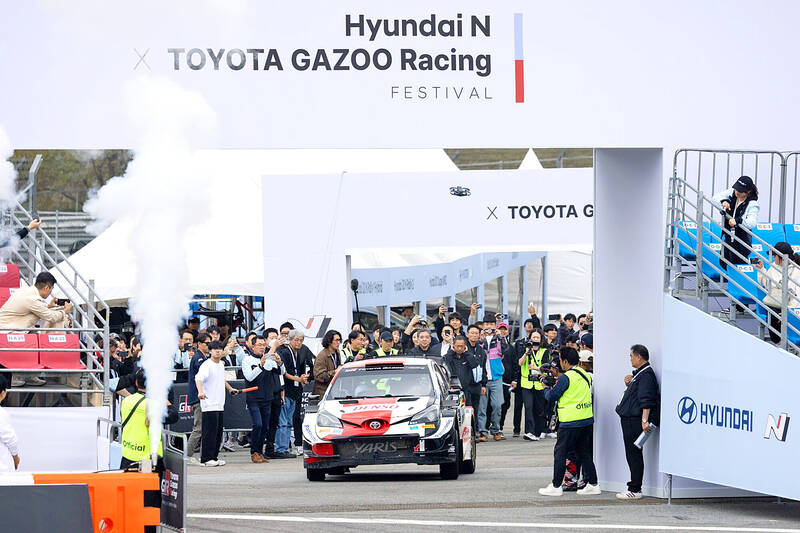The chairmen of Asia’s two largest automakers made a rare joint public appearance at an event to showcase their companies’ high-performance vehicles, underscoring the trend of rivals joining hands in the face of electrification.
Toyota Motor Corp’s Akio Toyoda and Hyundai Motor Group’s Chung Eui-sun were at a racing festival in Yong-in, south of Seoul, over the weekend. Samsung Electronics Co chairman Jay Y. Lee and Hankook & Company Co chairman Cho Hyun-bum also attended to meet Toyoda and Chung.
The event displayed rally cars from both automakers and several future-oriented models, including hydrogen-powered vehicles.

Photo: Bloomberg
“Toyota and Hyundai are joining hands to create a better society and shape the future of mobility,” Toyoda said yesterday, adding that he and Chung discovered a shared passion for racing when they met earlier this year.
Toyota and Hyundai — the world’s No. 1 and No. 3 automakers by sales respectively — are facing intensifying competition in electric vehicles (EVs) from Tesla Inc and Chinese carmakers such as BYD Co (比亞迪), the biggest maker of EVs. As Asia’s top legacy automakers, they share similar challenges and ambitions. Both are proponents of hydrogen-powered vehicles in their push toward carbon neutrality.
Yesterday’s festival marks the first time the two auto giants have teamed up to hold an event, raising the prospect of further collaboration. Earlier this month, Toyota’s research unit and Hyundai’s Boston Dynamics Inc announced a plan to jointly develop humanoid robots with artificial intelligence.
Global car companies are increasingly joining forces on production and research and development to lower costs and boost competitiveness. Nissan Motor Co and Honda Motor Co in August announced a joint research agreement to develop a platform and technologies for next-generation software-defined vehicles.
Hyundai has also partnered with General Motors Co around joint product development, manufacturing and future clean energy technologies.
At the event, Hyundai showcased rally cars from its World Rally Championship program, including the i20 N Rally 1 Hybrid and i20 N Rally 2.
Toyota’s Gazoo racing unit presented its GR Yaris Rally 1 Hybrid, GR Yaris Rally 2, GR Supra and GR86 among others.

The US dollar was trading at NT$29.7 at 10am today on the Taipei Foreign Exchange, as the New Taiwan dollar gained NT$1.364 from the previous close last week. The NT dollar continued to rise today, after surging 3.07 percent on Friday. After opening at NT$30.91, the NT dollar gained more than NT$1 in just 15 minutes, briefly passing the NT$30 mark. Before the US Department of the Treasury's semi-annual currency report came out, expectations that the NT dollar would keep rising were already building. The NT dollar on Friday closed at NT$31.064, up by NT$0.953 — a 3.07 percent single-day gain. Today,

‘SHORT TERM’: The local currency would likely remain strong in the near term, driven by anticipated US trade pressure, capital inflows and expectations of a US Fed rate cut The US dollar is expected to fall below NT$30 in the near term, as traders anticipate increased pressure from Washington for Taiwan to allow the New Taiwan dollar to appreciate, Cathay United Bank (國泰世華銀行) chief economist Lin Chi-chao (林啟超) said. Following a sharp drop in the greenback against the NT dollar on Friday, Lin told the Central News Agency that the local currency is likely to remain strong in the short term, driven in part by market psychology surrounding anticipated US policy pressure. On Friday, the US dollar fell NT$0.953, or 3.07 percent, closing at NT$31.064 — its lowest level since Jan.

The Financial Supervisory Commission (FSC) yesterday met with some of the nation’s largest insurance companies as a skyrocketing New Taiwan dollar piles pressure on their hundreds of billions of dollars in US bond investments. The commission has asked some life insurance firms, among the biggest Asian holders of US debt, to discuss how the rapidly strengthening NT dollar has impacted their operations, people familiar with the matter said. The meeting took place as the NT dollar jumped as much as 5 percent yesterday, its biggest intraday gain in more than three decades. The local currency surged as exporters rushed to

PRESSURE EXPECTED: The appreciation of the NT dollar reflected expectations that Washington would press Taiwan to boost its currency against the US dollar, dealers said Taiwan’s export-oriented semiconductor and auto part manufacturers are expecting their margins to be affected by large foreign exchange losses as the New Taiwan dollar continued to appreciate sharply against the US dollar yesterday. Among major semiconductor manufacturers, ASE Technology Holding Co (日月光), the world’s largest integrated circuit (IC) packaging and testing services provider, said that whenever the NT dollar rises NT$1 against the greenback, its gross margin is cut by about 1.5 percent. The NT dollar traded as strong as NT$29.59 per US dollar before trimming gains to close NT$0.919, or 2.96 percent, higher at NT$30.145 yesterday in Taipei trading